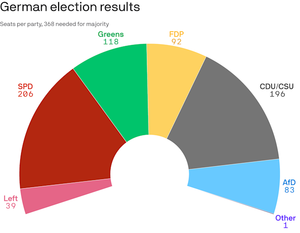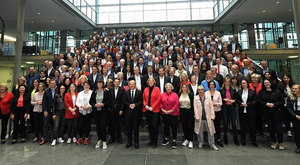Difference between revisions of "2021 German parliamentary election"
m (Text replacement - " government overreach" to " government overreach") |
|||
| Line 59: | Line 59: | ||
Purely as an election strategy, it is strange that the established parties would behave in this way and continue the [[demonization]] of the unvaccinated, for then to get a result with 90% for the established parties. This is only the behavior of someone who knows for sure that his “party” will definitely win the election, regardless of the real circumstances.<ref>http://blauerbote.com/2021/09/22/die-herrschenden-parteien-rechnen-offenbar-fest-mit-wahlfaelschung/</ref> | Purely as an election strategy, it is strange that the established parties would behave in this way and continue the [[demonization]] of the unvaccinated, for then to get a result with 90% for the established parties. This is only the behavior of someone who knows for sure that his “party” will definitely win the election, regardless of the real circumstances.<ref>http://blauerbote.com/2021/09/22/die-herrschenden-parteien-rechnen-offenbar-fest-mit-wahlfaelschung/</ref> | ||
| − | In an opinion poll from the INSA institute, [[dieBasis]] got a double-digit percentage of the vote, although, thanks to a total blackout in the {{ccm}}, only one in two voters had heard about the party at all.<ref>https://apolut.net/pressemitteilung-insa-umfrage-sieht-diebasis-im-zweistelligen-bereich/</ref> The final official outcome, 1,35 %, is remarked upon by the [[Tagesspiegel Online]],<ref>https://www.tagesspiegel.de/berlin/1-35-prozent-fuer-die-basis-ich-befuerchte-dass-man-den-zahlen-tatsaechlich-trauen-kann/27653576.html</ref> which is instrumental in towing the official line when it comes to corona legislation and badmouthing all who raise their voice against government overreach. | + | In an opinion poll from the INSA institute, [[dieBasis]] got a double-digit percentage of the vote, although, thanks to a total blackout in the {{ccm}}, only one in two voters had heard about the party at all.<ref>https://apolut.net/pressemitteilung-insa-umfrage-sieht-diebasis-im-zweistelligen-bereich/</ref> The final official outcome, 1,35 %, is remarked upon by the [[Tagesspiegel Online]],<ref>https://www.tagesspiegel.de/berlin/1-35-prozent-fuer-die-basis-ich-befuerchte-dass-man-den-zahlen-tatsaechlich-trauen-kann/27653576.html</ref> which is instrumental in towing the official line when it comes to corona legislation and badmouthing all who raise their voice against [[government overreach]]. |
==Widespread fraud, errors, or glitches changed the outcome== | ==Widespread fraud, errors, or glitches changed the outcome== | ||
Latest revision as of 15:24, 21 October 2024
 The makeup of the new Bundestag | |
| Date | 26 September 2021 |
|---|---|
| Location | Germany |
| Description | Possibly the most important German election in decades. Social media ruthlessly deleted charges of election fraud - which were confirmed in 2023. |
The 2021 German parliamentary election took place on Sunday 26 September 2021 to elect the members of the 20th Bundestag, while State elections in Berlin and Mecklenburg-Vorpommern were also held. Angela Merkel chose not to run again for election but remains Chancellor of Germany until a successor takes office.[1]
The race to succeed Angela Merkel (GLT 1993) failed to produce a clear winner, with the centre-left Social Democrats (SPD) just 10 seats ahead of the centre-right conservative alliance CDU/CSU, which failed to finish top for the first time in 16 years.[2] The election’s winners were the 3rd biggest Alliance 90/The Greens and the liberal Free Democrats (FDP) in 4th place, which became partners in a "traffic light" (SPD-Greens-FDP) coalition, which implemented some of the most wide-reaching changes in modern German history, including breaking energy ties with Russia.
Accusations of election irregularities were systematically censored. Two years later, in 2023, courts ruled that some of the elections had to be rerun, due to irregularities.
Following the election Olaf Scholz, Robert Habeck, Annalena Baerbock, Cem Özdemir, Karl Lauterbach and Christian Lindner came into power.
Contents
Timeline
On 11 August 2021, the parties launched their election campaigns.[3]
On 3 September 2021, The Guardian reported that the contest is too close to call.[4]
Campaign issues
The main issue according to commercially-controlled media appears to be Climate change.[5] After huge deadly floods in Germany, voters are urging for climate action.[6] Euronews published six stories to outline the issues in the election.[7]
Other issues include:
- COVID-19 response in Germany
- Corruption
- Jobs
- Open borders
Candidates for Chancellor
- Annalena Baerbock (YGL 2020)
- Armin Laschet
- Olaf Scholz
- Markus Söder (ACG/YL/2001) - (until 20th April 2021)[8][9]
Parties
- CDU, the biggest bloc since 2005, came second to the SPD
- SPD, leading the polls in the runup, won a plurality of seats
- FDP, COVID sceptical, smallest member of the traffic light coalition
- Alliance 90/The Greens, the second largets party in the coalition, came in 6th place in 2017. The Greens took more big donations than the CDU.[10]
- AFD, the largest party outside the coalition, expected to win fewer seats than in 2017, COVID opposition
- Die Linke, new leadership in 2021, had a poor showing, just above 5%, the vote share necessary to win seats
- dieBasis, "the anti Corona party" in Germany, Reiner Fuellmich as candidate for the chancellorship
Polls
Opinion polls have fluctuated over the course of the campaign. Social media companies like Facebook banned dieBasis,[citation needed] a protest party against lockdowns.
Controversies
- Widespread use of postal voting, leading to some claims of potential fraud, claims which were duly banned by social media corporations.
- Two lists were rejected; Greens in Saarland and the AFD in Bremen
The elephant in the room
In the year before the election a huge chunk of the population - the "unvaccinated" - was systematically attacked, slandered and threatened by the established parties. According to the “vaccination percentage” this is almost 40% of the population. It cannot be assumed that this group of people would have voted for one of the parties that threaten to annihilate them. Furthermore, many had themselves "vaccinated" in order to regain some of the freedoms that had been taken from them, and not for health reasons. Here, too, not everyone would be happy with the established parties. Even among the happily “vaccinated”, some are likely to be very angry at the actions of the ruling parties.
Purely as an election strategy, it is strange that the established parties would behave in this way and continue the demonization of the unvaccinated, for then to get a result with 90% for the established parties. This is only the behavior of someone who knows for sure that his “party” will definitely win the election, regardless of the real circumstances.[12]
In an opinion poll from the INSA institute, dieBasis got a double-digit percentage of the vote, although, thanks to a total blackout in the commercially-controlled media, only one in two voters had heard about the party at all.[13] The final official outcome, 1,35 %, is remarked upon by the Tagesspiegel Online,[14] which is instrumental in towing the official line when it comes to corona legislation and badmouthing all who raise their voice against government overreach.
Widespread fraud, errors, or glitches changed the outcome
Youtube stated it will censor anyone spreading "false claims that widespread fraud, errors, or glitches changed the outcome' of this election. It is very conspicuous that YouTube specifically singled out "all past US presidential elections and the German federal election 2021" as targets for narrative control, without mentioning any other elections.[15]
The state election in Berlin was dominated by chaos, with long queues in front of polling stations and wrong or too few ballot papers.[16] In Charlottenburg-Wilmersdorf, for example, where the ballots ran out early, all 22 electoral districts reported exactly the same preliminary official final result. Four days after the district election office published a remarkable statement: The outcome of the election was based on an estimate - that is, the distribution of the percentages between the parties was pure fiction. District Mayor Reinhard Naumann stated this was "normal" - and called criticism of this "groundless".[17] Voter turnout in Berlin-Reinickendorf was 150%, in Tempelhof-Schöneberg the turnout was even higher, at 159%.[18] Polling stations in which members of Die Partei ("The Party") went voting, declared zero votes for it afterwards.[19]
The journalist Jens Bernert pointed out: "The electoral irregularities in the Berlin state elections, which takes place at the same time as the federal elections and which is allowed to be reported on YouTube, could be conceived as a magic show-like diversionary maneuver in an election fraud scenario for the federal elections. A thought experiment: the viewers look spellbound at the show effect while the actual trick takes place in a completely different place."[20].
Courts order repeat of the elections
In November 2022, the Berlin State Constitutional Court ruled that the election to the Berlin House of Representatives has to be repeated due to numerous irregularities. The repeat election was held in February 2023.[21]
In December 2023, the Federal Constitutional Court ruled that during the 2021 Bundestag election, errors occurred in 455 Berlin electoral districts that would require a new vote there, which was held in February 2024[22].
Election day

Armin Laschet suffered an embarrassing blunder when casting his vote.[23]
Bundestag election, House of Representatives election, BVV election, expropriation referendum and Berlin marathon in one day: It has been known for several months that election Sunday will be a day of superlatives. Still, it seems like the capital wasn't prepared for it.
Results
Olaf Scholz and his SPD won the most seats. It was the worst result for the CDU since WW2.
Analysis
Bad for Russian-Western relations.[24]
Referring to the lack of common ground between the parties on Monday 27 September 2021, Greens chancellor candidate Annalena Baerbock joked:
- "I assume we all love to eat ice cream."[25]
New MPs
The election saw some significant firsts:
- Nyke Slawik and Tessa Ganserer (Grüne) became Germany's first transgender MPs.
- Adis Ahmetovic and Jasmina Hostert (SPD) became Germany's first MPs of Bosnian descent. They are advocates of Bosnia and Herzegovina joining the EU and NATO.
- Ye-One Rhie (SPD) became the first Korean MP.[26]
- Awet Tesfaiesus (Grüne) became Germany's first black woman MP. Born in Eritrea she claimed asylum in Germany after her father became wanted by the authorities for support of Eritrean independence which overthrew the government of the Ethiopian Empire. She is an advocate of mass immigration into Europe to "change the image of 'Germanness".[27]
- In whole there were 24 new MPs with Balkan roots. They all support the European Union expanding into countries like Serbia, Croatia, Albania and Kosovo.[28]
Related Documents
| Title | Type | Publication date | Author(s) | Description |
|---|---|---|---|---|
| Document:Why Angela Merkel has lasted so long | Article | 30 July 2021 | Wolfgang Streeck | 2 months before the September 2021 elections in which Angela Merkel will retire as Chancellor, a German economic sociologist writes as to why and how she has been able to hold onto power in Germany for so long after an unprecedented 16 years in power. |
| Document:Would-be German chancellor Scholz jumps the gun on EU expansion eastward, which may provoke more states to follow the UK and exit | Article | 15 August 2021 | Paul Nuttall | Olaf Scholz is a possible candidate for Chancellor of Germany at the September 2021 German parliamentary election. He has warned Russia to expect further European integration and expansion into Eastern Europe. Will this encourage more countries to follow the UK and leave the European Union? |
References
- ↑ "German Election Results"
- ↑ "Germany election: SPD wins narrow victory as Merkel era ends in near-deadlock"
- ↑ https://www.euronews.com/2021/08/11/german-election-political-parties-kick-off-their-campaigns-ahead-of-pivotal-vote/
- ↑ https://www.theguardian.com/commentisfree/2021/sep/03/the-guardian-view-on-germanys-election-struggling-to-move-on-from-merkel
- ↑ https://www.politico.eu/article/germany-election-2021-armin-laschet-green-targets-threaten-social-peace/
- ↑ https://www.bbc.co.uk/news/world-europe-58550337
- ↑ https://www.euronews.com/2021/09/21/german-election-mini-series-six-stories-to-explain-the-pivotal-vote
- ↑ https://www.spiegel.de/politik/deutschland/armin-laschet-reaktionen-soeder-war-erkennbar-der-kandidat-der-herzen-a-1bfe7ffa-99f6-46cf-bbbb-e4530b4c52ae
- ↑ https://www.stuttgarter-zeitung.de/inhalt.nach-votum-des-cdu-vorstands-markus-soeder-zieht-kanzlerkandidatur-zurueck.e61eb3e2-3d7e-4d3d-9e4c-95694d1346df.html
- ↑ https://www.theguardian.com/world/2021/sep/07/german-greens-receive-more-large-donations-than-angela-merkels-party
- ↑ https://reitschuster.de/post/peinliche-panne-ard-vermeldet-wahl-hochrechnung-zwei-tage-vor-wahl/
- ↑ http://blauerbote.com/2021/09/22/die-herrschenden-parteien-rechnen-offenbar-fest-mit-wahlfaelschung/
- ↑ https://apolut.net/pressemitteilung-insa-umfrage-sieht-diebasis-im-zweistelligen-bereich/
- ↑ https://www.tagesspiegel.de/berlin/1-35-prozent-fuer-die-basis-ich-befuerchte-dass-man-den-zahlen-tatsaechlich-trauen-kann/27653576.html
- ↑ https://support.google.com/youtube/answer/10835034?hl=en#zippy=%2Cvoter-suppression%2Celection-integrity saved via Archive.org, saved via Archive.is
- ↑ https://www.t-online.de/region/berlin/news/id_90867686/wahlchaos-in-berlin-grundgesetz-mit-fuessen-getreten-wahl-muss-wiederholt-werden.html
- ↑ https://checkpoint.tagesspiegel.de/langmeldung/3i3Bk7cAtvB2WgBbCB4L9H?utm_source=tagesspiegel&utm_medium=hp-teaser&utm_campaign=corona-verhandelbar-fuer-bezirksbuergermeister
- ↑ https://checkpoint.tagesspiegel.de/newsletter/4ANKPdA5pgvLf4o8vuB9OX
- ↑ https://www.lto.de/recht/nachrichten/n/wahl-fehler-berlin-wahlpruefungsbeschwerde-die-partei-sonneborn-bundestagswahl-abgeordnetenhaus-verfassungsgericht/
- ↑ http://blauerbote.com/2021/10/02/wahlfaeschung-rekordwahlbeteiligung-in-berlin-reinickendorf-150-nur-in-tempelhof-schoeneberg-liegt-die-wahlbeteiligung-laut-offiziellen-zahlen-mit-159-noch-hoeher/
- ↑ https://www.rbb24.de/politik/wahl/abgeordnetenhaus/agh-2023/beitraege/berlin-wahl-wiederholung-verfassungsgericht-urteil-entscheidung-2021-2023.html
- ↑ https://www.tagesschau.de/inland/berlin-wahl-wiederholung-106.html
- ↑ https://www.youtube.com/watch?v=PFwoqbg02yQ
- ↑ https://www.rt.com/russia/535921-german-election-moscow-berlin/
- ↑ "German elections: After close result, jockeying to replace Merkel begins"
- ↑ https://www.koreatimes.co.kr/www/nation/2021/10/177_316182.html
- ↑ https://www.nytimes.com/2021/11/05/world/europe/germany-black-woman-bundestag.html
- ↑ https://balkaninsight.com/2021/09/27/german-parliament-gets-24-new-mps-with-balkan-roots/
